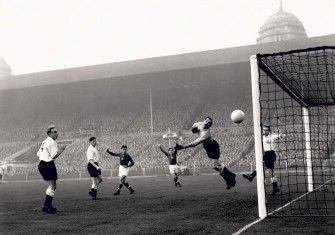Flannelled Fools
A history of sport in England hits a six.

Bill Shankly may have been kidding when he remarked that some supporters think ‘football is a matter of life and death, but I assure you, it’s much more serious than that’. Yet it is impossible to understand the English people without an appreciation for the place of sport in their history and how it embodies their love of liberty and tradition, from the cock pit to the cricket field. As Robert Colls argues in This Sporting Life, sport has long been a preoccupation of the English, but it is more than merely a pastime for what Kipling called ‘flannelled fools at the wicket, muddied oafs at the goal’. It is bound up, in Colls’ view, with:
playing the game, enjoying the land, sensing the liberty, respecting contestation, valuing home, showing a bit of heart, recognising it in others, knowing that not everyone is political, or has to be, that not everyone knows what they think or (whichever comes first) how to say it, and understanding above all that sport is an enduring part of our liberty.
In the 19th century it was sometimes said that to interest an Englishman in war it was best to compare the conflict to a game (whereas to interest a Frenchman in games one must compare them to a war) – as the schoolboy’s voice did when it rallied the ranks in Henry Newbolt’s poem Vitai Lampada. Newbolt’s poetry and the public school sporting ethos encoded much of the high Victorian stoicism and stiff-upper-lippery that inspired the footballers and cricketers of the two world wars to great heights of gallantry, from Billy Nevill leading the Middlesex Regiment over the top and dribbling a football into no-man’s-land, to the tally-hoing fighter aces of 1940.
The hunting cries of Leicestershire are familiar territory to Colls, who although a native of South Shields, built his academic career in the two universities of Leicester (to this day Leicester City FC take to the field to the strains of the Post Horn Gallop). Those Tyneside roots have given him an inevitable passion for football, but Colls’ omnivorous interests as a historian makes him equally at home on the hunting field as on the football terrace. His opening chapter on the chic and dangerous world of riding to hounds is a useful reminder of the centrality of equine pursuits in English culture. After all, it is telling that the Duke of Wellington fought the Battle of Waterloo in the blue coat of the Beaufort Hunt and that at Balaklava cavalry scouts had informed the Light Brigade that the going was ‘good’ in the Valley of Death.
In Colls’ thesis the observance of custom is the bedrock of England and, therefore, of freeborn English men and women. As even the great jurist Lord Blackstone put it, for all the grandeur of the British constitution, it was nothing more than a set of customs. Therefore, the carnage of bear-baiting in Stamford or Shrovetide football in Ashbourne were matters of deep political principle and would yield only very reluctantly to civilising influences by the interfering middle classes. Such is This Sporting Life’s more theoretical argument that emerges from time to time, but at heart this book is the best kind of social history: vivid, revelatory and penned by an author who seems to know the byways of every county in England.
Colls helps us explain the origins of stock English sporting types, those blacksmiths on the village green like Beefy Botham and Freddie Flintoff, or sporting gents such as Lord Lonsdale and Douglas Jardine, and the role of class on the sports field. He can help us understand, too, the thrilling freedom that sport provided, not in an abstract sense, but for the pitmen who yearned to stretch their legs after hours underground (and how this, plus their athleticism and instinctive teamwork, made them such formidable footballers), or for youths like ‘Smithie’, the borstal boy in Alan Sillitoe’s The Loneliness of the Long-Distance Runner, who finds in his cross country runs mental clarity as much as an exhilarating sense of release. Yet Colls is alive, too, to the misery of compulsory sport for many, with interesting diversions into the history of the gymslip, or why working-class girls – traditionally dragooned early into domestic chores in a way that boys seldom were – simply didn’t have the time or energy for the back-lane football that preoccupied their brothers.
But this is a joyous book of dazzling scholarship. ‘I see sport now as all the more extraordinary for its ordinariness’, he concludes, ‘for how it has reached into every part of our imagination.’ Colls has shown us how a sort of cultural archaeology can locate the roots of Englishness in the places where custom brought the people together – and, since the first race was run and ball was kicked, has made them such consistently good sports.
This Sporting Life: Sport & Liberty in England, 1760-1960
Robert Colls
Oxford 416pp £25
Dan Jackson is the author of The Northumbrians: North East England and Its People, A New History (Hurst, 2019).






